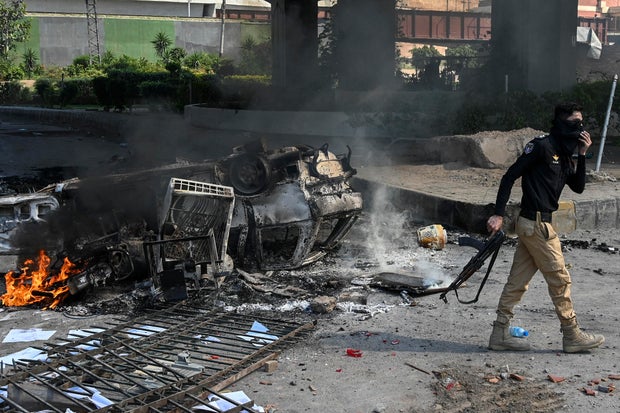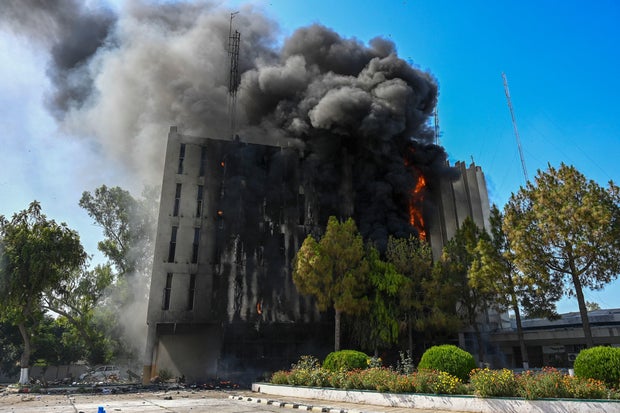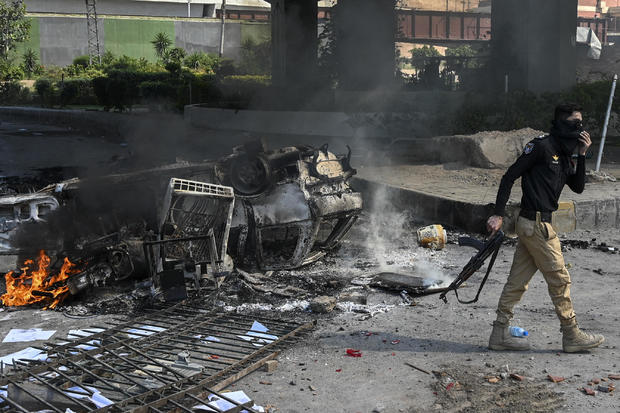Islamabad — Pakistan’s major cities were again hit by deadly riots and disorder Wednesday as a court in the capital Islamabad ordered former Prime Minister Imran Khan to be held in custody for eight days on corruption charges. Army troops have deployed on the streets of two of the country’s biggest provinces, Punjab and Khyber Pukhtunkhwa, amid the chaos sparked by the former leader’s arrest. At least eight people have been killed amid the clashes, according to a senior government official, but Khan’s party claims the real death toll is in the dozens.
Officials said at least four people were killed Wednesday in the northwest city of Peshawar as supporters of Khan’s Pakistan Tehreek-e-Insaaf (PTI) political party stormed the offices of national broadcaster Radio Pakistan. It was just one of many manifestations of rage among Khan’s backers following his arrest Tuesday morning as he appeared in a court to face corruption charges.
Shooting could be heard from Peshawar’s Bala Hisaar fort, which houses a military facility. One protester was killed in the southwest city of Quetta on Tuesday, bringing the officially confirmed death toll from two days of rioting to at least five. The PTI, however, claims about 50 people have been killed and more than 1,000 arrested.

ABDUL MAJEED/AFP/Getty
Police said in a Wednesday statement that officers in Pakistan’s biggest province, Punjab, had arrested at least 945 Khan supporters since Tuesday, including senior PTI leader Asad Umar. Dozens of Khan supporters were also detained in Islamabad, Karachi, Peshawar and elsewhere. At least 157 police officers have been injured in clashes with Khan supporters, officials said.
Schools across the country were closed and major roads remained quiet or deserted as people not involved in the protests largely opted to stay indoors. Several major social media platforms were offline in the country and internet connections were either suspended or patchy as authorities clamped down on communications in a bid to quell the unrest.
Khan was ousted from power last year, losing a no-confidence vote in parliament, but the former national cricket star remains one of Pakistan’s most popular politicians. He came to power in 2018, backed by the country’s powerful military, but has since spectacularly fallen out with the army’s leadership, even publicly accusing a senior officer of plotting to assassinate him.
When he was arrested Tuesday, Khan was appearing in court on several corruption charges brought by Islamabad police. As he showed up in court, dozens of agents from the National Accountability Bureau, backed by paramilitary troops, stormed the courtroom, breaking windows after Khan’s guards refused to open the door.
Khan’s supporters quickly attacked the military’s headquarters in the garrison city of Rawalpindi, near Islamabad, but did not reach the main building housing the offices of army chief Gen. Asim Munir.
Other demonstrators tried to reach the office and residence of current Prime Minister Shebaz Sharif, who’s backed by the military, in Lahore, but were driven off by baton-wielding in police. Others attacked vehicles carrying troops and hit armed soldiers with sticks.

ABDUL MAJEED/AFP/Getty
So far, authorities have said that neither police nor soldiers have fired live ammunition at protesters. Unverified videos posted on social media since Tuesday, however, show men in plainclothes shooting during protests in several cities.
Pakistan’s military issued its first reaction to the unrest Wednesday, calling the attacks “targeting army property and installations” a “black chapter” in the country and vowing that it would “not allow anyone to take the law into their hands.”
The army said Khan had been arrested “in line with the NAB statement and law” and called those rioting against his detention “miscreants” trying to “evoke the nation’s emotions for achieving their limited and selfish objectives.”
None of the leaders of Khan’s party have denounced the attacks on the military, but they have publicly called for demonstrations to remain peaceful.
The violent unrest has prompted calls from the U.S. and U.K. for their citizens to avoid travel to Pakistan and to take all possible steps to remain safe if already in the country.
